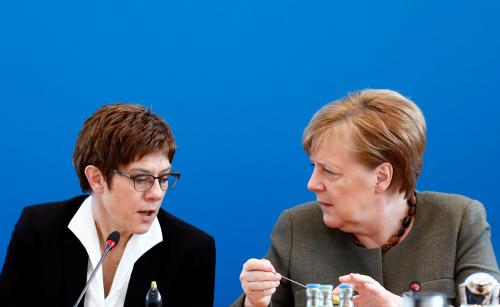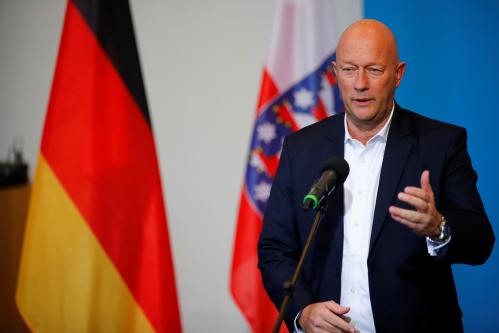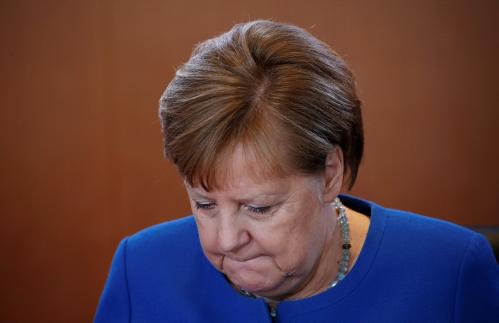Approximately one month after Thuringia’s regional parliament elected a minister president with the support of the far-right Alternative for Germany (AfD) and unleashed a political firestorm that shattered Chancellor Angela Merkel’s succession plans, a governing coalition has been formed in the small eastern German state. In fact, it’s pretty much the old government, because as of March 4, the former Left Party Minister President Bodo Ramelow is once again heading a coalition with the Social Democrats (SPD) and Greens.
How he got there is important, though — not just for regional politics in Thuringia, but for the future of national politics in Germany.
As breathlessly reported in Die Zeit’s live ticker, on two separate votes in the parliament, Ramelow failed to achieve a majority while running against Björn Höcke, the leader of the Alternative for Germany (AfD) in Thuringia. Both times, Ramelow came in four votes shy, with 42, while Höcke received 22; 21 parliamentarians, likely members of the Christian Democratic Union (CDU), abstained. That Ramelow failed to achieve a majority against Höcke — whom German newspapers routinely and now legally refer to as a fascist — was unsurprising, as the CDU has ruled out working with the Left Party in addition to the AfD, effectively equating cooperation with the two.
The parliament then moved to a third vote, with the caveat that a winning candidate now only needed to receive the most votes. Yet rather than standing a third time against Ramelow, Höcke withdrew his candidacy, causing a further last-minute rule change. Now, members of parliament had to vote “yes,” “no,” or abstain. Under these new rules, a winning candidate had to receive more “yes” votes than “no” votes.
This last-minute change by the AfD put the CDU in the difficult position of either having to vote against Ramelow, making his ability to secure a plurality questionable, or to abstain. Abstaining, however, would invite accusations from the AfD that the CDU had broken its campaign promise to not cooperate with the Left Party by tacitly supporting Ramelow. Ultimately, Ramelow won the third vote, receiving the same 42 “yes” votes, but 23 “no” votes — crucially, one more than in the two previous votes.
This renewed Red-Red-Green government looks set to remain in power for approximately a year, with the next elections planned for April 25, 2021, at least if an agreement struck between Ramelow’s coalition and the CDU before the election is upheld. In the meantime, the Thuringia CDU intends to serve as a “constructive” opposition, lending support to the governing coalition where necessary.
It would be unwise, though, to assume that this represents an end to political shenanigans in Thuringia. Immediately after Ramelow’s election, emotions ran high in the parliament. Ramelow refused to shake Höcke’s hand, prompting a standoff on the chamber floor as Höcke stayed planted in front of him, insisting on a handshake. Ramelow later accused the AfD of “trampling” democracy and of being “arsonists,” and underlined his willingness to work with all “democrats” — in other words, not with the AfD. That Ramelow later elected an AfD politician to be a parliamentary vice president underscores the dangerous situation in Thuringia. Respecting the democratic order means allowing the participation of parties with anti-democratic tendencies — a fact acknowledged by Ramelow himself.
The month-long Thuringian stalemate holds important lessons for German politics. One, the AfD remains combative and intent on weaponizing the vulnerabilities of other parties. Two, those vulnerabilities are real, forcing mainstream parties into new, and for them, uncomfortable, collaborations.
But this week, the German government struck back, officially classifying the hard-right wing of the AfD — the Flügel — as far-right extremists hostile to the German constitution, allowing it to be put under observation by the Bundesverfassungsschutz, the domestic intelligence service. And the leader of the Flügel? None other than Björn Höcke.
The Brookings Institution is committed to quality, independence, and impact.
We are supported by a diverse array of funders. In line with our values and policies, each Brookings publication represents the sole views of its author(s).










Commentary
The government crisis in Germany’s Thuringia is over — except it isn’t
March 16, 2020